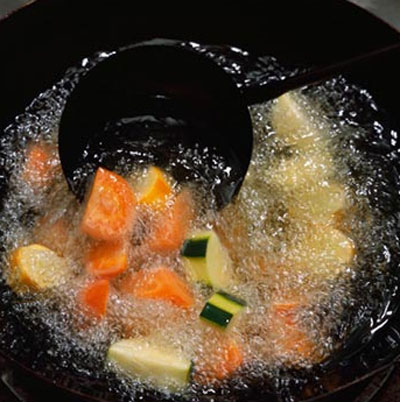Turn used cooking oil into biofuel
Scientists from Vietnam Institute of Chemistry, Institute of Science and Technology have successfully produced biofuels from waste vegetable oil.

Used vegetable oil (cooking oil) can be collected for processing,
processing of biological materials.
Many studies show that cooking oil when boiled over and over again at high temperatures will oxidize and polymerize, thus losing nutrition, especially, when the food is burnt black in the oil environment will become carbon deposits, causes cancer, cardiovascular disease, Parkinson's disease, dementia and liver-related diseases.
Mr. Tran Quang Vinh, Institute of Chemistry said, besides causing very bad effects on human health, the discharge of vegetable oil directly into the environment also causes serious pollution of water sources, soil and air. . Meanwhile, waste vegetable oil is similar in composition to vegetable oil, which is suitable to be used as a biomass source for biofuel production.
Hotel Nguyen Thi Thanh Loan, Institute of Chemistry said that processed waste vegetable oil has complex components, in addition to grease and contains many impurities such as salt, mechanical impurities, carbon deposits, water, sugar . That is, before cracking (the chemical reaction process that breaks down long chain hydrocarbons into short hydrocarbons), waste vegetable oil needs to be treated to remove impurities.
The results obtained after the cracking process of waste vegetable oil are dry gas (containing mainly H2, CO, CO2, CH4, C2H6, C2H4), liquefied gas, and gasoline. These products are fully usable and of good quality.
Also according to the research team, besides turning vegetable oil waste into biofuel for human life, the topic also optimizes catalytic material sources using silicon source extracted from rice husk, one cheap agricultural products available in Vietnam.
Prof. Dr. Le Thi Hoai Nam, chair of the project, said that the products that can be used as a base-phase biofuel and petroleum-based fuels on the market will make the fuel quality better. . If produced on an industrial scale, it is possible to lower the cost of fuel. At the same time, it opens a research direction to produce fuel from inedible vegetable oils such as palm oil and Jatropha oil.
In Vietnam in recent years, the amount of petroleum import has continuously increased, averaging 7-9% per year. According to statistics, in 2010, Vietnam imported about 16.5 million tons of petroleum to meet the domestic demand of about 17 million tons.
According to the Biofuels Development Project to 2015 and vision to 2025 drafted by the Ministry of Industry and Trade and approved by the Prime Minister on November 20, 2007, Vietnam will produce 250 thousand tons of ethanol and oil by 2015. plants, mixing 5 million tons of E5 (95% of traditional petroleum with 5% ethanol) and B5 (95% of petroleum and petroleum with 5% of biodiesel) to meet 1% of the country's petroleum demand .- Converting waste cooking oil into biofuel
- Video: Device to turn urine into cooking fuel
- 6 healthy cooking oils
- Cars run on cooking oil
- Aircraft use cooking oil to save money
- How to use the most beneficial cooking oil
- Turn E.coli bacteria into biofuel
- 7 tips for using healthy cooking oil
- Overview of biofuels
- The habit of using oil wrongly can easily lead to liver cancer
- Regular cooking can live longer
- Harmful effects of cooking oil on the body
 Why do potatoes have eyes?
Why do potatoes have eyes? 'Tragedy' the world's largest carnivorous life: Death becomes ... public toilet
'Tragedy' the world's largest carnivorous life: Death becomes ... public toilet Tomatoes were once considered 'poisonous' for 200 years
Tomatoes were once considered 'poisonous' for 200 years Detecting microscopic parasites on human face
Detecting microscopic parasites on human face